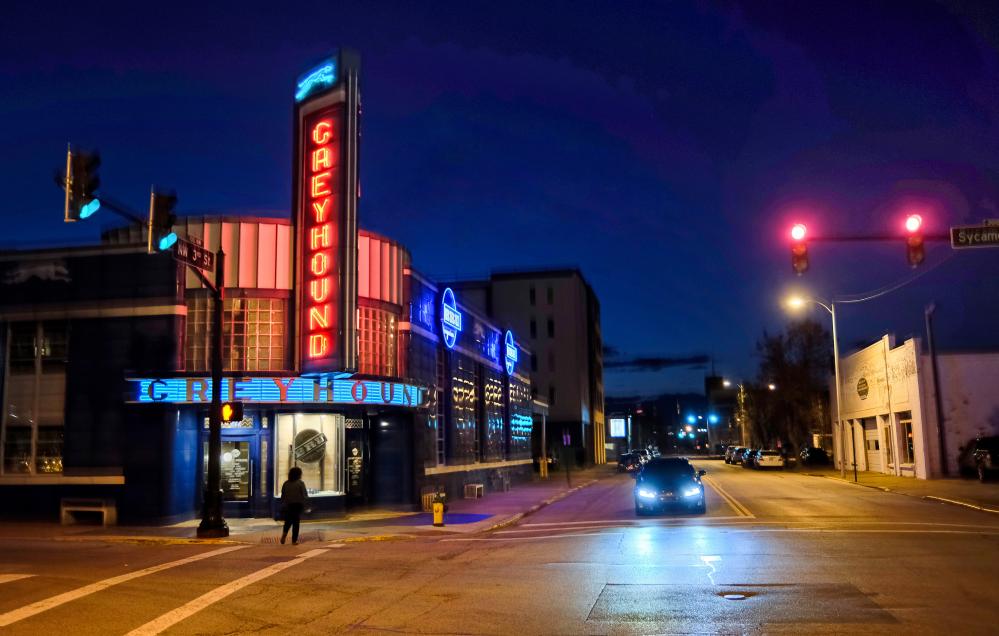
Life in Evansville, Indiana, during the 20th century mirrored much of the rest of the US’s industrial midwest: booming growth powered by manufacturing in the early decades – then a steep decline that left its streets empty and economy in practical ruins.
Since its heyday as an industrial powerhouse in the 1960s, Evansville’s population has fallen by 18%.
But today, following decades of urban decay, downtown life in this city of 115,000 people is changing.
It boasts hundreds of new apartments, a host of breweries, a thriving arts scene and even a Taylor Swift-themed escape room.
“It’s a more vibrant space. You’ve got more residents downtown, which means more businesses, more hotels [and] a new medical campus,” the mayor of Evansville, Stephanie Terry, said recently of the current downtown compared to a decade ago.
“People are really energized.”
These and other changes prompted Logan Jenkins, a southern California native, to move to Evansville last year as part of a relocation program that offers a number of perks to move there and to other cities.
“I would have been one of 10 such businesses in Indianapolis, or one of 20 in Cincinnati,” he said.
Jenkins works with tech startups and the local university, and he said that living downtown means he is within walking distance of about 20 restaurants and cafes.
“The big thing for me is that there’s times where I don’t have to drive for a week,” he said.
Evansville isn’t alone.
At a time when some major US cities are grappling with business closures and high rents, a number of small, post-industrial cities in the midwest are experiencing a boom centered on their downtown cores.
In Lansing, Michigan, another former industrial hub that’s lost tens of thousands of residents since its mid-20th century heyday, local and state authorities plan to invest more than a quarter-billion dollars on housing, a music and arts center and other community projects.
Similar experiences are playing out in Dayton, Ohio; Charleston, West Virginia; and other smaller, once-struggling manufacturing towns.
The turnaround is being fueled by a combination of affordable housing, flexible work environments and other opportunities. The Joe Biden White House is spending billions of dollars across the midwest in an attempt to turn the Rust Belt into America’s “Silicon Heartland” – meaning that thousands of new jobs are en route to the region. A 40-minute drive north of downtown Evansville, Toyota is investing $1.4bn to manufacture a new electric vehicle that is expected to bring hundreds of new jobs into the area.
The rise of work from home means that cities are looking towards concepts such as the 18-hour streetscape, which places recreation and housing alongside, rather than secondary to, access to work. In many towns in the midwest, that means breweries inside residential apartment buildings, free outdoor concerts and whitewater parks opening up.
In 2019, Evansville was ranked the city with the most homeowners in their 20s per capita in the country. Affordable housing projects on the city’s Lincoln Avenue, Market Street and Bond Street have all broken ground or opened in recent years, with the number of downtown housing units rising from 176 a decade ago to 568 today – with another 228 under construction.
But while there’s been significant progress for smaller mid-western cities, challenges remain.
Even though housing costs are a fraction of larger US cities, many small post-industrial communities still find themselves in need of thousands more affordable housing units, an issue that has given rise to tenants’ unions forming in a number of cities. A dearth of grocery stores and pharmacies is also a common gripe of downtown residents in places in Ohio such as Toledo and Dayton – and elsewhere, including Charleston, West Virginia.
And despite the recent progress made, the populations of many smaller post-industrial cities are either stagnant or continuing on a decades-long decline.
However, experts say that has been alleviated in part by growing numbers of immigrant communities moving into downtowns and inner-ring city neighborhoods.
“A lot of midwestern cities are becoming destinations for new immigrants,” said Faranak Miraftab, a professor at the University of Illinois Urbana-Champaign’s department of urban and regional planning.
“Creating welcoming immigrant cities is one approach city officials are adopting because these new populations have been a source of revival, whether they are tiny towns or mid-size cities.”
One thing not lacking in many small midwestern cities is the availability of developable space in the downtown core. In downtown Evansville, an 18-story former bank on Main Street that was demolished three years ago is set to be replaced with retail spaces and 165 apartments, some of which are designated as affordable housing.
A five-minute walk down the same street towards the Ohio river, there’s a line out the door of an Irish bar that opened for the first time the previous day, one of 44 new ground-floor businesses in the area. Inside recently there was a throbbing atmosphere of revelers watching Poland v Austria in Euro 2024.
Three blocks south, feted design firm Sasaki has been contracted to put together a plan that would reimagine the city’s riverfront for miles in either direction.
As Terry, the mayor, put it: “Just the number of respondents from the community we’ve had to the plan – over 2,000 people contributed.
“It’s a testament that people are really excited.”
EMEA Tribune is not involved in this news article, it is taken from our partners and or from the News Agencies. Copyright and Credit go to the News Agencies, email news@emeatribune.com Follow our WhatsApp verified Channel





